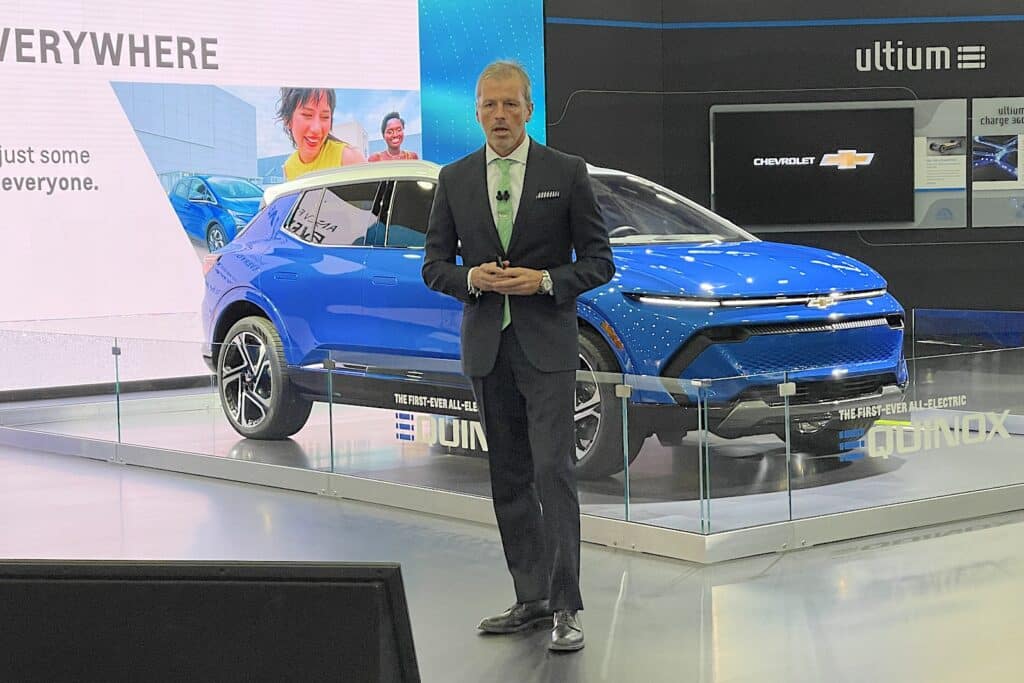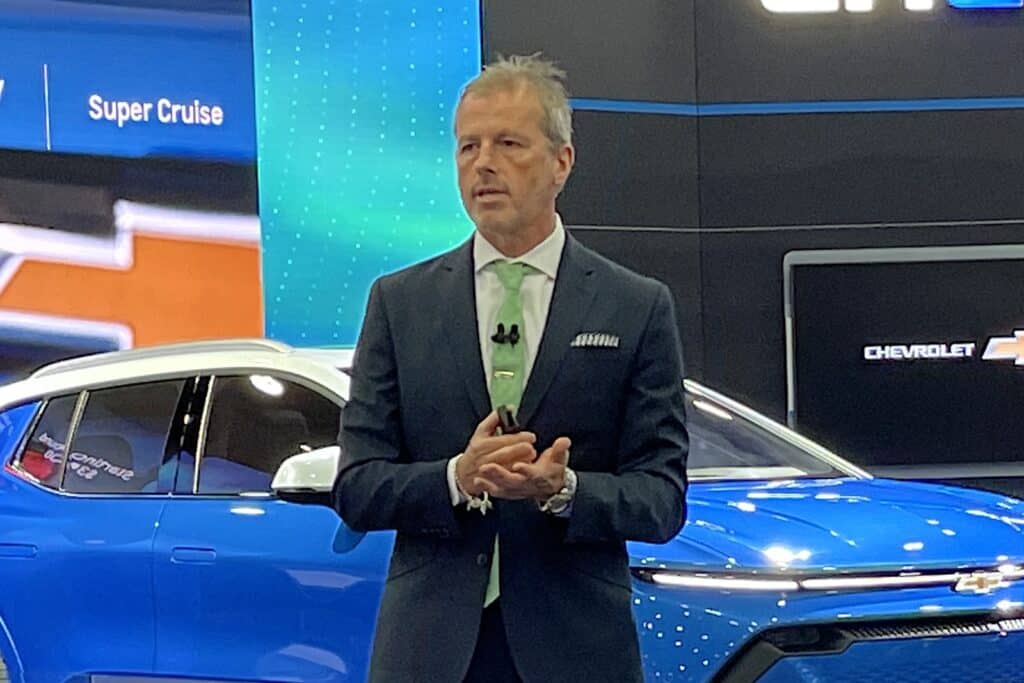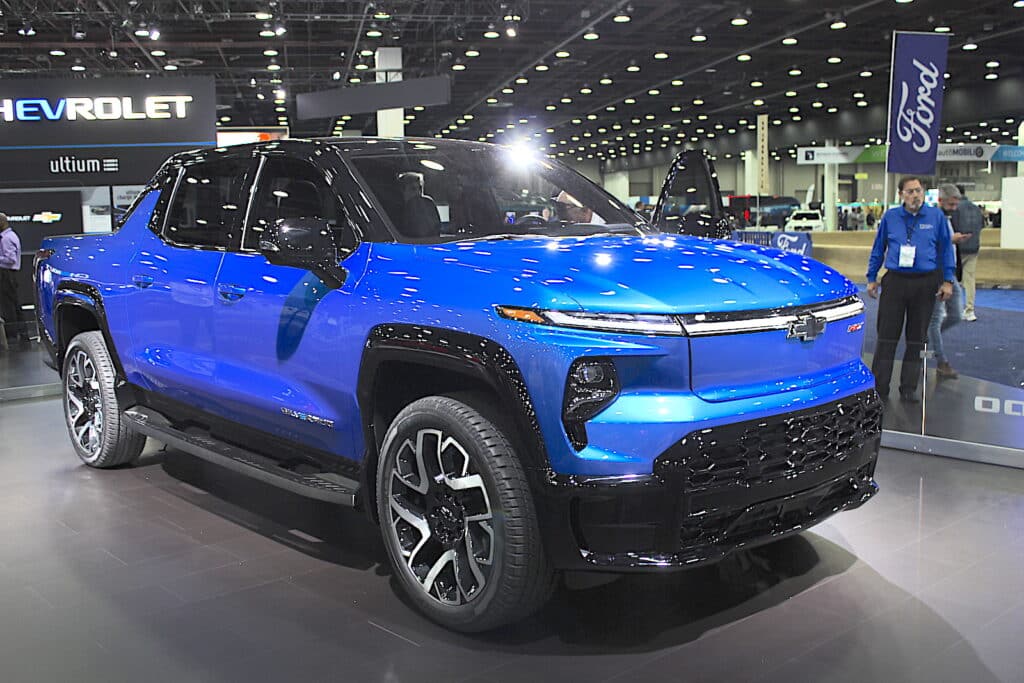A new Chevrolet ad campaign aims to move battery-electric vehicles out of a narrow ghetto and convince even the most skeptical car buyers that they’re “for everyone, everywhere.”

But truly convincing Americans that EVs are ready to go mainstream isn’t something that one manufacturer can do on its own, acknowledged Chevy’s marketing chief Steve Majoros. This is a rare situation where automakers will be dependent upon one another’s new products and marketing efforts.
The bowtie brand’s big ad campaign will kick off this coming Sunday afternoon with spots on the Fox NFL broadcast, followed by the NBC Sunday night football broadcast. Dubbed, “EVs for everyone, everywhere,” the push will quickly expand to other broadcast programs, as well as social media outlets, Majoros told TheDetroitBureau.com during an interview at the North American International Auto Show.
Changing the conversation
The campaign will highlight the rapidly growing line-up of Chevrolet-branded battery-electric vehicles. The automaker launched its first long-range model, the Bolt EV, in 2016. In recent months it has announced plans for numerous others, including the Blazer EV, the Silverado EV and the Equinox EV. Those models are set to reach market in 2024. An all-electric version of the Chevy Corvette EV will follow, the automaker recently revealed, though it has not confirmed the timing of that rollout.

“The objective and goal is making sure Americans know Chevrolet is credibly and competently in the EV conversation,” Majoros said.
What he didn’t say was the brand hopes to move the conversation past the problems Chevy had with the Bolt EV and newer Bolt EUV. A series of fires forced it to recall about 142,000 of those EVs to replace their battery packs. It took the two Bolt models out of production for roughly half a year, as well. With the EV and EUV variants back in showrooms, Chevy announced it would cut prices to as low as $26,595 to help rebuild demand.
EV sales surge 750%
By focusing on the newer offerings, the largest General Motors brand believes it can capitalize on growing interest in battery-electric technology. As recently as 2019, EVs made up barely 1% of the overall U.S. market. That reached about 5% by the end of 2021 and, noted Majoros, rose to 7.5% in August.
Industry analysts, such as Sam Abuelsamid of Guidehouse Insights, have given at least some of the credit to the rapid increase in the number of EVs coming to market. Last year ended with about 15 long-range models available in U.S. showrooms. It will come closer to 50 this year, based on product plans revealed by the industry. And that’s expected to near 140 by mid-decade, according to AutoForecast Solutions.

But where manufacturers typically battle it out against each other’s new products, there’s been an unusual shift when it comes to EVs. Carmakers like Chevrolet recognize that the increase in offerings — and the expansion into new product segments — is helping convince skeptical buyers that EVs are a viable choice, Majoros said.
“You see a lot more adoption (as a) high tide raises all boats,” he said. “As you see more (battery-electric vehicles) more people talk about EVs and that normalizes the EV lifestyle. As you see your neighbors and your friends with EVs, and see more charging stations, there’s more sensitivity,” added Majoros, which translates into a greater willingness to consider buying one.
Capitalizing on that rising tide
For Chevy itself, “The trick now is to capitalize on that intent and interest.”
It’s EV product offensive is aimed at a broad spectrum of buyers and, in particular, those customers who might have thought they couldn’t afford the price of entry.
After the price reduction for the 2023 model year, the Bolt EV is the least expensive long-range model on the market. And Chevy has promised to bring in the base version of the Equinox at slightly over $30,000. That’s less than half what the typical battery-electric vehicle went for in the U.S. last month. In fact, that will be barely 60% of the average transaction price for the typical vehicle using an internal combustion engine.
“Maybe EVs have seemed out of reach,” said Majoros. “That changes with a product like (Equinox).”
Familiar names
Chevy took another step to make EVs seem like a viable choice, the marketing chief noted. Where a number of competitors are opting for new — and sometimes confusing — names for their own EVs, like the Toyota bZ4X, Chevrolet is keeping things familiar.
With names like Equinox EV and Silverado EV, “We want people to feel these are products and brands that are familiar and that you can trust” Majoros explained, “just a different propulsion system and a different design language.”







